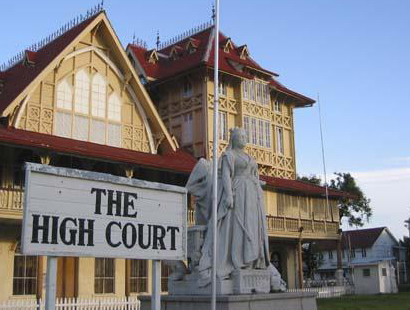Chancellor (ag) Carl Singh has said that at least one leg of the IDB-funded justice sector reform programme project made significant strides in achieving the targets set though questions remain over the pace of the reform.
Under the project, new Rules of the High Court were recently completed and later approved by National Assembly, and a Constitutional and Administration Law Court will be established shortly as a division of the High Court.
The Chancellor made this disclosure during an interview with Stabroek News and according to him, the Project Execution Unit (PEU) of the High Court, which he heads, has wrapped up a significant portion of the work outlined in the scope of responsibilities.
The US$10 million Inter-American Development Bank (IDB) funded Modernization of Justice Administration System Programme is being executed in two components – the High Court and the Ministry of Legal Affairs – headed by Justice Singh and Minister of Legal Affairs Charles Ramson SC respectively.

The reduction of the case backlog is proving to be one of the more difficult sub-components of the project, Justice Singh said, noting that funding for the backlog remains a critical issue. To aid in the backlog reduction, new High Court Civil Procedure Rules were developed and consultations were held within the justice system. Additionally, a number of methodologies for the backlog reduction were also developed, but the next step is to secure the appointment of part-time judges after which the work would begin.
With respect to the new High Court rules, Justice Singh said that a date has to be fixed to bring them into effect, and observed that the members of the Bar need to be fully sensitized on the rules because “they bring fundamental changes” to the practice and procedure of civil jurisdiction in the High Court. He said too that the sensitization programme would begin in the early months of the New Year while the rules are expected to likely roll out by the end of June 2011.
Of the various components, the strengthening of the court administration is lagging behind since according to the Chancellor only about ten per cent of this work is completed. The objective, as outlined in the project, is to strengthen the administration of the Supreme Court in the management of cases and case-related information, human resources and its budgeting and financial activities.
Chancellor Singh pointed out that the problems are with the organization and management study, and financial unit improvement. He noted that the activities were advertised twice but both times the responses were poor. Currently the PEU is in the process of procuring an individual consultant for the physical reorganization of the Registry; the provision and installation of File/Document Management System for the Registry; the development of a website for the Supreme Court and the networking and installation of an intranet system for the Court.
He said too that the PEU has executed activities that included the development of JSC governance policies, operational rules and regulations, and a new code of conduct and ethics for judges and magistrates.
The Chancellor pointed out that the project also required them to consider the feasibility of moving the court administration staff from under the responsibility of the Public Service Commission (PSC) to the Judicial Service Commission (JSC). Unfortunately, Cabinet has since requested that the consultancy be put on hold.
Justice Singh also mentioned that the PEU will soon conduct workshops for judges and magistrates to sensitize them on the new JSC rules and regulations in addition to looking at finance facility improvements required for the establishment of a JSC Secretariat. In addition, he said, they have developed legal training manuals for judges and magistrates in the areas identified.
Further, the Chancellor said that that PEU has also developed a Bail Act for judges and magistrates; sentencing guidelines for judges and magistrates, and the cost assessment guidelines for judges. He added the judiciary now has to send a circular to the judges advising that the developed guidelines must be applied.
Extensive consultations
Lisa Ramotar, Project Coordinator at the High Court PEU told Stabroek News that they have benefited from extensive consultations with the persons working within the court system, particularly the judges and magistrates.
The Chancellor praised Ramotar for her work on the project saying her direction at the PEU was instrumental in “getting things done”. For her part, she said a great deal of work has been executed within the past year and she stressed that the unit has not been operating in isolation.
She pointed out that Chancellor remains the “point-person” on the project, adding that she is playing a supporting role. However, she did discuss the rehabilitation and physical improvement aspect of the project saying the unit has executed roughly 50 per cent of the activities.
To date, they have conducted an electrical audit of the High Court and Court of Appeal; procured two generators for the High Court and the Court of Appeal and are currently conducting physical; rehabilitation works at New Amsterdam, Reliance and Sisters magistrates’ courts. Works are also expected to commence shortly at the Georgetown Magistrate’s Court, according to her.
The PEU is also considering installing Automatic Speech Recognition equipment at the High Court and Court of Appeal and later extending this to the Georgetown Magistrate’s Court.
On the issue of the courts, she noted that the conditions across the country at some court houses are not conducive for working. She said the reform programme is aimed at improving conditions in court rooms and also refurbishing dilapidated courts to increase the number of courtrooms functioning in the country.
Sisters Magistrate’s Court in Berbice which was out of operation owing to its decrepit state is around 98 per cent rehabilitated according to Ramotar. She said too that works are also near completion at the Reliance Magistrate’s Court.
The Modernization of Justice Administration System Programme officially ends in March 2011; it is aimed at reducing the backlog of cases; strengthening the Judicial Service Commission; enhancing the skills and productivity of judges; High Court administration; rehabilitation and physical improvement of court rooms and improvement to civil and criminal law procedures among other areas.





